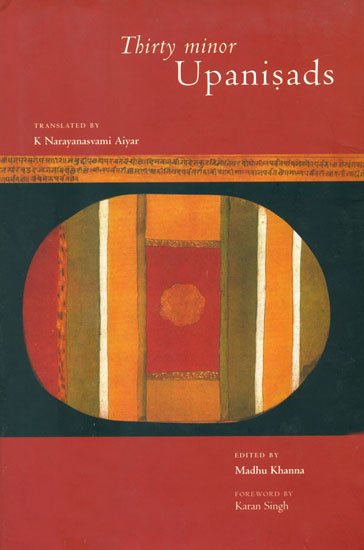Thirty minor Upanishads
by K. Narayanasvami Aiyar | 1914 | 95,228 words
This book contains the English translation of thirty minor Upanishads.—Fourteen belonging to Vedanta, two are categorised as Physiological, three are Mantra, two are Sannyasa and the remaining nine are categorised as Yoga-Upanishads. These Upanishads are properly defined as the Aranya-portion of the Vedas (most ancient Hindu scriptures) and are so-...
Maitreya Upanishad of Samaveda, Chapter I
A King named Bṛhadratha, thinking this body to be impermanent and having acquired indifference (to objects), retired to the forest, leaving his eldest son to rule over (his) kingdom. With hands uplifted and eyes fixed on the sun, he performed a severe Tapas (or religious austerity). At the end of a thousand days, the Lord Śākāyanya Muni, a knower of Ātmā, who was like fire without smoke, and who was as a scorching fire with his Tejas (spiritual lustre) approached (him) and addressed the King thus: "Rise, rise and choose a boon." The King prostrated before him and said: "O Lord, I am not an Ātmavit (or knower of Ātmā). Thou art a Tattvavit, we hear. Please enlighten me about Sattva (the state of Sat or Brahman)." (To which) the Muni replied thus: "O thou that art born of the race of Ikṣvāku: To begin with, your question is difficult (of explanation): do not question me. Ask for any other thing you desire."
Thereupon the King touched the feet of Śākāyanya and recited the (following) verse:
"What is the use of these to me or any other? Oceans dry up. Mountains sink down. The positions of Dhruva (the Polar Star) and of trees change. Earth is drowned. The Suras (angels) run away, leaving their (respective) places. (While such is the case), I am He in reality. Therefore of what avail to me is the gratification of desires, since one who clings to the gratification of desires is found to return again and again to this Saṃsāra (mundane existence)? Thou art able to extricate me (out of this Saṃsāra). I am drowned like a frog in a dry well. Thou art my refuge.
"O Lord! this body was the result of sexual intercourse. It is without wisdom; it is hell (itself). It came out through the urinary orifice. It is linked together by bones. It is coated over with flesh. It is bound by skin. It is replete with fæces, urine, Vāyu (air), bile, phlegm, marrow, fat, serum and many other impurities. O Lord! to me in such a foul body (as this), thou art my refuge."
Thereupon Lord Śākāyanya was pleased and addressed the King thus: "O Mahārāja, Bṛhadratha, the flag of the Ikṣvāku race, thou art an Ātmajñānī. Thou art one that has done his duty. Thou art famous by the name of Marut." At which the King asked: "O Lord! in what way, can you describe Ātmā?"
To which he replied thus:
"Sound, touch, and others which seem to be Artha (wealth) are in fact Anartha (evil). The Bhūtātmā (the lower Self) clinging to these, never remembers the Supreme Seat. Through Tapas, Sattva (quality) is acquired; through Sattva, a (pure) mind is acquired; and through mind, (Parama-) Ātmā, (the higher Self) is reached. Through attaining Ātmā, one gets liberation. Just as fire without fuel is absorbed into its own womb, so Citta (thought) through the destruction of its modifications is absorbed into its own womb (source). To a mind that has attained quiescence and truth, and which is not affected by sense-objects, the events that occur to it through the bondage of Karma are merely unreal. It is Citta alone that is Saṃsāra. It should be cleansed with effort. Whatever his Citta (thinks), of that nature he becomes. This is an archaic mystery. With the purifying of Citta, one makes both good and bad Karmas to perish. One whose mind is thus cleansed attains the indestructible Bliss (through his own Self). Just as Citta becomes united with an object that comes across it, so why should not one (be released) from bondage, when one is united with Brahman. One should meditate in the middle of the lotus of the heart, Parameśvara (the highest Lord) who is the witness to the play of Buddhi, who is the object of supreme love, who is beyond the reach of mind and speech, who has no beginning or end, who is Sat alone being of the nature of light only, who is beyond meditation, who can neither be given up nor grasped (by the mind), who is without equal or superior, who is the permanent, who is of unshaken depth, who is without light or darkness, who is all-pervading, changeless and vehicleless, and who is wisdom of the nature of Mokṣa (salvation). I am He—that Paramātmā who is the eternal, the pure, the liberated, of the nature of wisdom, the true, the subtle, the all-pervading, the secondless, the ocean of bliss, and one that is superior to Pratyagātmā (the lower Self). There is no doubt about it. How will calamity (or bondage) approach me who am depending upon my own bliss in my heart, who have put to shame the ghost of desires, who look upon this universe as (but) a jugglery and who am not associated with anything. The ignorant with their observance of the castes and orders of life obtain their fruits according to their Karmas. Men who have given up all duties of castes, etc., rest content in the bliss of their own Self. The distinctions of caste and orders of life have divisions among them, have beginning and end, and are very painful. Therefore having given up all identification with sons and as well as body, one should dwell in that endless and most supreme Bliss."
